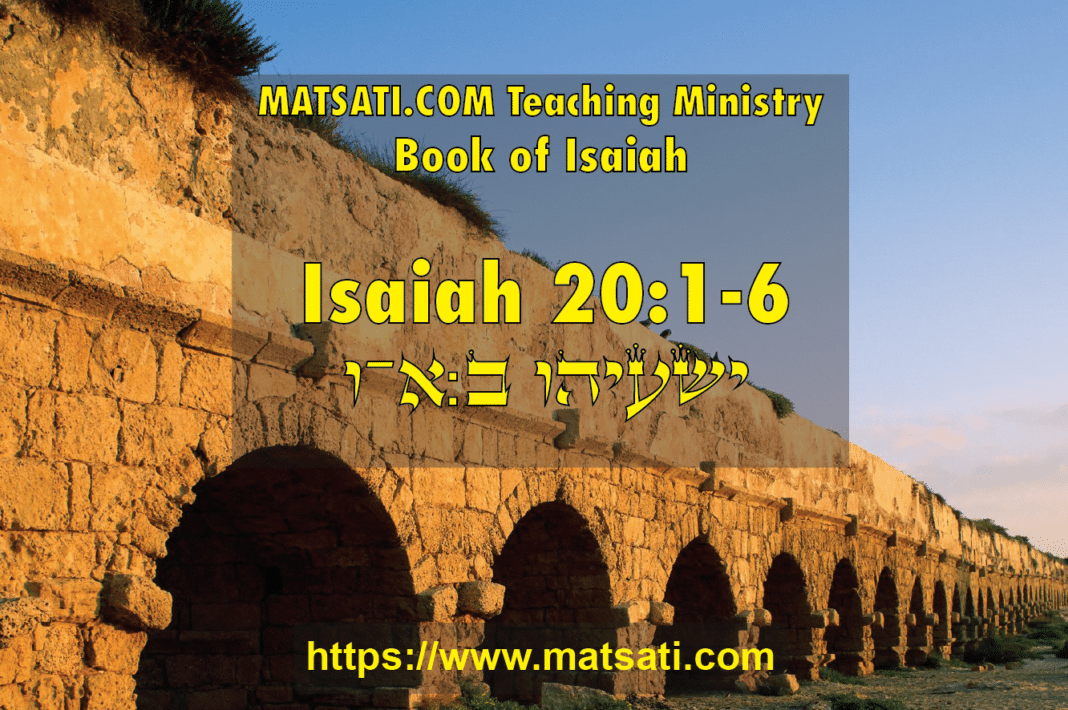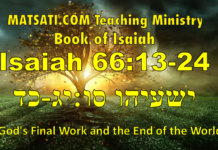Isaiah 20:1-6
Isaiah 20 opens with an oracle against Egypt. Isaiah provides the consequences of what happens when one trusts in Egypt. The outcome is not good because Egypt herself is under the judgment of God and so this nation becomes useless to provide much help. The commentaries state that the Ethiopian Shabako consolidated upper and lower Egypt in 714 BC and so this led to Egypt taking a stand against Sargon (John Oswalt). The commentators agree that these passages relate to the time period of 713-711 BC. However, Clements claims a date of 705 BC and Kaiser 587 BC. John Oswalt states, “Clements argues that the original account must have depicted Ashdod’s fall, whereas the present text represents a reworking of the earlier story for its use against Egypt at some time when Judah was particularly tempted to trust Egypt—thus, 705. Kaiser sees the story as a prophetic legend and thus applies it to a much later time, just before the fall of Jerusalem in 587 when Egypt seemed the only hope against Nebuchadrezzar. Neither of the proposed dates is anything but conjecture, the original having been discarded.” Ashdod (Philistine city) was leading a revolt against Sargon who had set up a regent whose name was Ahimiti. Ahimiti was removed from power and Yamani was placed in power as king in 713 BC. These events took place surrounding 2 Kings 18:17 The king of Assyria sent his supreme commander, his chief officer and his field commander with a large army, from Lachish to King Hezekiah at Jerusalem. They came up to Jerusalem and stopped at the aqueduct of the Upper Pool, on the road to the Washerman’s Field. (NIV) The Assyrians were victorious against the rebellion and Yamani fled to Egypt. It is believed that it is against this backdrop that Isaiah is making his prophecy that was inspired by God against Egypt. Isaiah literally acted out what it meant to trust in Egypt as opposed to trusting in God by living naked for 3 years. The purpose of this was to demonstrate how futile and foolish it was to rely upon Egypt as opposed to the Lord God Almighty in heaven. Isaiah opens saying the following:

ספר ישעיה פרק כ
א בִּשְׁנַת בֹּא תַרְתָּן אַשְׁדּוֹדָה בִּשְׁלֹח אֹתוֹ סַרְגוֹן מֶלֶךְ אַשּׁוּר וַיִּלָּחֶם בְּאַשְׁדּוֹד וַיִּלְכְּדָהּ:
Isaiah 20:1 states, “In the year that Tartan came unto Ashdod, (when Sargon the king of Assyria sent him,) and fought against Ashdod, and took it; (בִּשְׁנַת בֹּא תַרְתָּן אַשְׁדּוֹדָה בִּשְׁלֹח אֹתוֹ סַרְגוֹן מֶלֶךְ אַשּׁוּר וַיִּלָּחֶם בְּאַשְׁדּוֹד וַיִּלְכְּדָהּ)” Isaiah opens with a historical data point saying בִּשְׁנַת בֹּא תַרְתָּן אַשְׁדּוֹדָה בִּשְׁלֹח אֹתוֹ “In the year that Tartan of Ashdod sent him.” We can read about Sennacherib interactions in the Scriptures, “Tiglath-pileser” (2 Kings 15:29), “Pilneser” (1 Chronicles 5:26), “Shalmeneser” (2 Kings 17:3), “Pul” (2 Kings 15:29), “Sargon” (Isaiah 20:1), “Asnapper” (Ezra 4:10), “Rabba” (Ezra 4:10), and “Yaqqira” (Ezra 4:10). Tartan (תַּרְתָּן, tartan) is a title of a high Assyrian commander (2 Kings 18:17, Isaiah 20:1). Like Rabsaris and Rabshakeh, this title has been regarded as a proper name, but is more likely a designation (John Oswalt). The title is attributed to one of Sennacherib’s messengers to Hezekiah (2 Kings 18:17) and to one of Sargon’s generals (Isaiah 20:1).
ספר ישעיה פרק כ
ב בָּעֵת הַהִיא דִּבֶּר יְהֹוָה בְּיַד יְשַׁעְיָהוּ בֶן-אָמוֹץ לֵאמֹר לֵךְ וּפִתַּחְתָּ הַשַּׂק מֵעַל מָתְנֶיךָ וְנַעַלְךָ תַחֲלֹץ מֵעַל רַגְלֶיךָ וַיַּעַשֹ כֵּן הָלֹךְ עָרוֹם וְיָחֵף: ג וַיֹּאמֶר יְהֹוָה כַּאֲשֶׁר הָלַךְ עַבְדִּי יְשַׁעְיָהוּ עָרוֹם וְיָחֵף שָׁלשׁ שָׁנִים אוֹת וּמוֹפֵת עַל-מִצְרַיִם וְעַל-כּוּשׁ: ד כֵּן יִנְהַג מֶלֶךְ-אַשּׁוּר אֶת-שְׁבִי מִצְרַיִם וְאֶת-גָּלוּת כּוּשׁ נְעָרִים וּזְקֵנִים עָרוֹם וְיָחֵף וַחֲשֹוּפַי שֵׁת עֶרְוַת מִצְרָיִם:
Isaiah 20:2 states, “At the same time spake the LORD by Isaiah the son of Amoz, saying, (בָּעֵת הַהִיא דִּבֶּר יְהֹוָה בְּיַד יְשַׁעְיָהוּ בֶן-אָמוֹץ לֵאמֹר) Go and loose the sackcloth from off thy loins, and put off thy shoe from thy foot. And he did so, walking naked and barefoot. (לֵךְ וּפִתַּחְתָּ הַשַּׂק מֵעַל מָתְנֶיךָ וְנַעַלְךָ תַחֲלֹץ מֵעַל רַגְלֶיךָ וַיַּעַשֹ כֵּן הָלֹךְ עָרוֹם וְיָחֵף)” Isaiah 20:3 “And the LORD said, Like as my servant Isaiah hath walked naked and barefoot three years for a sign and wonder upon Egypt and upon Ethiopia; (וַיֹּאמֶר יְהֹוָה כַּאֲשֶׁר הָלַךְ עַבְדִּי יְשַׁעְיָהוּ עָרוֹם וְיָחֵף שָׁלשׁ שָׁנִים אוֹת וּמוֹפֵת עַל-מִצְרַיִם וְעַל-כּוּשׁ)” Isaiah 20:4 “So shall the king of Assyria lead away the Egyptians prisoners, and the Ethiopians captives, young and old, naked and barefoot, even with their buttocks uncovered, to the shame of Egypt. (כֵּן יִנְהַג מֶלֶךְ-אַשּׁוּר אֶת-שְׁבִי מִצְרַיִם וְאֶת-גָּלוּת כּוּשׁ נְעָרִים וּזְקֵנִים עָרוֹם וְיָחֵף וַחֲשֹוּפַי שֵׁת עֶרְוַת מִצְרָיִם)” Isaiah 20:2 states that the Lord told Isaiah to וּפִתַּחְתָּ הַשַּׂק מֵעַל מָתְנֶיךָ “untie/open the sackcloth from about thy loins” and this is an interesting observation that הַשַּׂק denotes the type of clothing Isaiah had on at this time. Note the statement לֵךְ וּפִתַּחְתָּ הַשַּׂק means literally “go and open the sack cloth” which suggests that Isaiah walked naked. According to the Scriptures, הַשַּׂק is worn as a sign of mourning or distress. According to the Psalms, “to untie someone’s sackcloth” is a figurative expression meaning to cause, or give to, any one joy (Tehillim / Psalms 30:12, הָפַ֣כְתָּ מִסְפְּדִי֮ לְמָח֪וֹל לִ֥י פִּתַּ֥חְתָּ שַׂקִּ֑י וַֽתְּאַזְּרֵ֥נִי שִׂמְחָֽה׃). Based upon this text and elsewhere הַשַּׂק is the distinctive aperal of the prophet, and is compared with the “hairy garment” of the prophets, who are referred to according to Zechariah 13:4 (4 “Also it will come about in that day that the prophets will each be ashamed of his vision when he prophesies, and they will not put on a hairy robe in order to deceive, וְהָיָ֣ה׀ בַּיּ֣וֹם הַה֗וּא יֵבֹ֧שׁוּ הַנְּבִיאִ֛ים אִ֥ישׁ מֵחֶזְיֹנ֖וֹ בְּהִנָּֽבְאֹת֑וֹ וְלֹ֧א יִלְבְּשׁ֛וּ אַדֶּ֥רֶת שֵׂעָ֖ר לְמַ֥עַן כַּחֵֽשׁ׃), or the camel’s-hair raiment of John the Baptist, or the sheepskin, or the like, which, it is argued what was Elijah’s official dress, see 2 Kings 1:8 where the Greek μηλωτὴ for אדרת in 1 Kings 19:13, 19:19 and 2 Kings 1:8, 1:12 may be reference to the wearing of the inner garment only instead as opposed to the normal attire. (see also Micah 1:8, Ezekiel 18:7, 18:16, and Isaiah 58:7) Comparing the LXX with the Masoretic text and the Targum Jonathan we see the following:
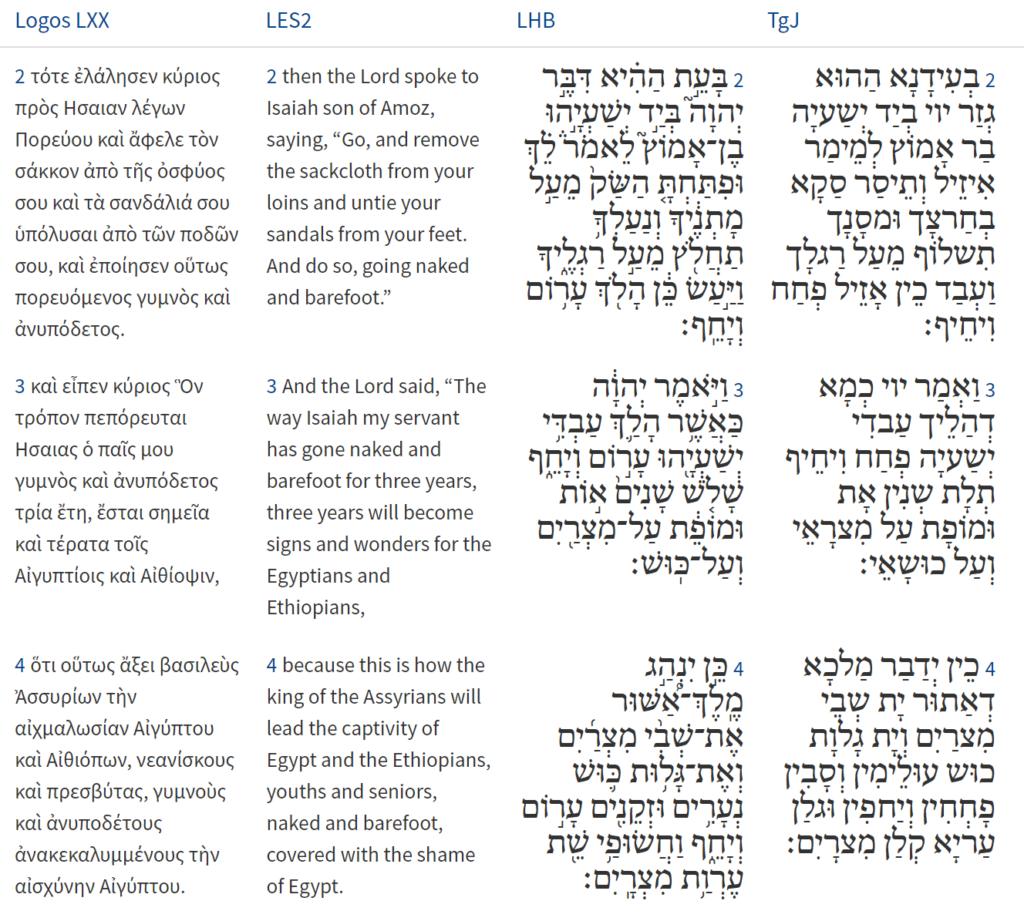
We note that Isaiah 20:2-4 are virtually identically translated, there are no differences between the Greek, Hebrew, and Aramaic renditions. The Hebrew words ערום, עירם no doubt commonly meant absolutely naked (Genesis 3:7 and 3:10.). To do this sort of thing, Isaiah would have exposed himself to three years of being made fun of and embarrassed by the people (2 Samuel 6:14 and 6:20). We note something here in Isaiah 20:3 ג וַיֹּאמֶר יְהֹוָה כַּאֲשֶׁר הָלַךְ עַבְדִּי יְשַׁעְיָהוּ עָרוֹם וְיָחֵף שָׁלשׁ שָׁנִים אוֹת וּמוֹפֵת עַל-מִצְרַיִם וְעַל-כּוּשׁ “And the LORD said, Like as my servant Isaiah hath walked naked and barefoot three years for a sign and wonder upon Egypt and upon Ethiopia.” This suggests that Isaiah had already done this act of walking naked for three years prior to the giving of this prophecy. So essentially Isaiah may have done this without telling the people why previously? Isaiah’s actions were not just for Israel, Judah and Jerusalem, but for all the nations (i.e. Egypt and Cush). The idea here is in being humiliated in war, being taken naked and stripped before all to see how they are being exported, demoralized, marched and moved from one nation to the next. We note that the word עָרוֹם does not provide for us a clear picture that Isaiah went completely nude. There are other uses of the words that suggest only partial nudity such as in 1 Samuel 19:24, Isaiah 58:7, Micah 1:8, also John 21:7)
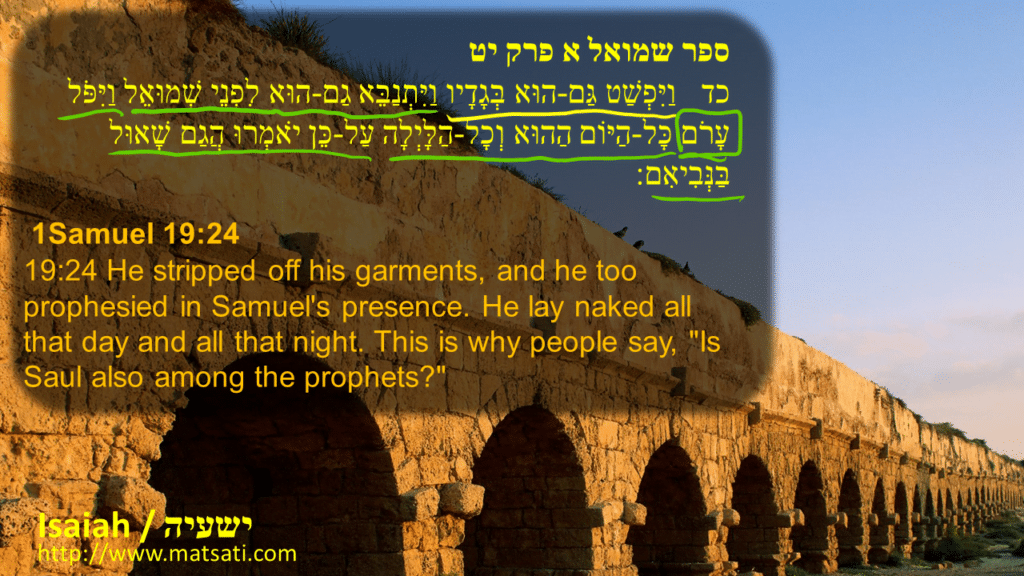
ספר שמואל א פרק יט
כד וַיִּפְשַׁט גַּם-הוּא בְּגָדָיו וַיִּתְנַבֵּא גַם-הוּא לִפְנֵי שְׁמוּאֵל וַיִּפֹּל עָרֹם כָּל-הַיּוֹם הַהוּא וְכָל-הַלָּיְלָה עַל-כֵּן יֹאמְרוּ הֲגַם שָׁאוּל בַּנְּבִיאִם:
1 Samuel 19:24
19:24 He stripped off his garments, and he too prophesied in Samuel’s presence. He lay naked all that day and all that night. This is why people say, “Is Saul also among the prophets?”
Isaiah going about naked presents a moral issue. The reason there are moral issues is concerning going about completely naked exposing oneself for everyone to see. It is interesting to consider these kinds of actions today. What would be the outcome of these actions that Isaiah took to a culture that is deviant, and sexually explicit such as those in the LGBT community having no well-balanced behavior or morals per the society of Isaiah’s day. The idea is that today this going naked may not have as much impact as it did in Isaiah’s day because of the moral decay of today’s society! Isaiah’s actions illustrate how Egypt is not to be trusted because this nation is under the judgment of God. The DSS 4Q169 A Commentary on Nahum writes about war and the stripping naked of those who were conquered.
DSS 4Q169: A Commentary on Nahum Frags. 3–4 ii:10-iii:2
| DSSSE:EN | DSSSE:TR | DSS:NT |
| 4Q169 Frags. 3–4 ii:10 10 will fall [due to the fero]city of their tongues. Blank Nah 3:5 See, I am against you!—oracle of YHWH of H[ost]s—You shall hoist | 4Q169 Frags. 3–4 ii:10 10 יפולו [מז]עם לשונם vacat הנני אליך נאם יהוה צ[באו]ת וגלית | 4Q169 Frags. 3–4 ii:10 10will perish through their [arrog]ant talk. According to Josephus, Jannaeus had to relinquish power over some of his Transjordanian conquests to buy the neutrality of the Arabians. The reference to “cities of the East” being “stripped” may be to this strategy. “See, I am against you, says the LORD of H[ost]s. You will strip off |
| 4Q169 Frags. 3–4 ii:11 11 [your] skirts up to your face and show the nations [your] nudity and kings {…} your shame. Blank Its interpretation […] … | 4Q169 Frags. 3–4 ii:11 11 שולי[ך ]על פניך והרא[י]ת גוים מער[ך] וממלכות {…} קלונך vacat פשרו .[…]… | 4Q169 Frags. 3–4 ii:11 11your skirts over your face and show the Gentiles [your] nudity, the kingdoms your shame” (3:5). This refers to […] |
| 4Q169 Frags. 3–4 ii:12 12 […] the cities of (the) East, because «the skirts» […] | 4Q169 Frags. 3–4 ii:12 12 […]ערי המזרח כי השול[י]ם[ …] | 4Q169 Frags. 3–4 ii:12 12[…] the cities of the East, for “the skirts” are […] |
| 4Q169 Frags. 3–4 iii Frags. 3–4 Col. III | 4Q169 Frags. 3–4 iii Frags. 3–4 III | 4Q169 Frags. 3–4 iii Col. 3 |
| 4Q169 Frags. 3–4 iii:1 1 The nations with their uncleanness [and with] their detestable abominations. Nah 3:6 I will throw refuse on top of you, [af]front you and make you | 4Q169 Frags. 3–4 iii:1 1 הגוים בנדתם [ובש]קוצי תועבותיהם והשלכתי עליך שקוצים [ונ]בלתיך ושמתיך | 4Q169 Frags. 3–4 iii:1 1the Gentiles in their filth [and in] their abhorrent [i]dols. “I will throw your abominations at you, I will treat you with scorn, I will make you |
| 4Q169 Frags. 3–4 iii:2 2 repulsive. Nah 3:7 And what will happen is that all those who see you will run away from you. Blank | 4Q169 Frags. 3–4 iii:2 2 כאורה והיה כול רואיך ידודו ממך vacat | 4Q169 Frags. 3–4 iii:2 2repulsive, so that everyone who sees you will avoid you” (3:6–7a). |
Michael Wise in his book “The Dead Sea Scrolls: A New Translation” writes “according to Josephus, Jannaeus had to relinquish power over some of his Transjordanian conquests to buy the neutrality of the Arabians. The reference to “cities of the East” being “stripped” may be related to this strategy.” The DSS commentary on Nahum writes 4Q169 Frags. 3–4 ii:11 “your skirts over your face and show the Gentiles [your] nudity, the kingdoms your shame” (3:5). This refers to and connects this to the abhorrent behavior of their idol worship, their abominations that are committed in their idolatry. The scriptures command the children of God and all men for that matter to not pursue idol worship. Living in a righteous manner is to be done above all other pursuits of the flesh and the imaginations of the heart. In the NT text, Paul writes to flee from idolatry, to keep ourselves from idols, to put to death the works of the flesh (sexual immorality, impurity, lust, greed) which are forms of idolatry. John writes in Revelation how even though mankind was stricken with plagues from God they still did not repent of the work of their hands and stop the worship of demons in their idolatry. (1 Corinthians 10:7, 10:14, 1 John 5:21, Colossians 3:5, Galatians 4:8, 5:19-21, Revelation 9:20) Isaiah says that the mighty Egypt, rich in culture and glory, because of their idolatry and sin will be carried off in shame. In the Commentaries, many authors write saying the “nakedness of Egypt” is a gloss. This claim however is without evidence, or they provide no good argument to support their opinion. So again, we see how the commentaries lead to some amount of doubt in the authenticity of God’s Word. The primary argument in the commentaries was that a good writer would not have used both “buttocks” and “nakedness” in the same line, but that is a judgment which is very hard to support when the writer in question (Isaiah) lived at least twenty-five hundred years prior to the commentator. Furthermore, it was important to distinguish exactly what nakedness meant, since looking at the Rabbinic literature, the rabbis say he was not completely naked. The baring of the buttocks suggests, however, that he was in fact naked. For further references to nakedness as disgrace, see Isaiah 3:17, Ezekiel 16:37, 23:10, and 23:29.
ספר ישעיה פרק כ
ה וְחַתּוּ וָבֹשׁוּ מִכּוּשׁ מַבָּטָם וּמִן-מִצְרַיִם תִּפְאַרְתָּם: ו וְאָמַר ישֵׁב הָאִי הַזֶּה בַּיּוֹם הַהוּא הִנֵּה-כֹה מַבָּטֵנוּ אֲשֶׁר-נַסְנוּ שָׁם לְעֶזְרָה לְהִנָּצֵל מִפְּנֵי מֶלֶךְ אַשּׁוּר וְאֵיךְ נִמָּלֵט אֲנָחְנוּ:
Isaiah 20:5 states, ”And they shall be afraid and ashamed of Ethiopia their expectation, and of Egypt their glory. (וְחַתּוּ וָבֹשׁוּ מִכּוּשׁ מַבָּטָם וּמִן-מִצְרַיִם תִּפְאַרְתָּם)” Isaiah 20:6 “And the inhabitant of this isle shall say in that day, Behold, such is our expectation, whither we flee for help to be delivered from the king of Assyria: and how shall we escape? (וְאָמַר ישֵׁב הָאִי הַזֶּה בַּיּוֹם הַהוּא הִנֵּה-כֹה מַבָּטֵנוּ אֲשֶׁר-נַסְנוּ שָׁם לְעֶזְרָה לְהִנָּצֵל מִפְּנֵי מֶלֶךְ אַשּׁוּר וְאֵיךְ נִמָּלֵט אֲנָחְנוּ)” So those who trust in Cush (Ethiopia, כּוּשׁ) will be dismayed (וְחַתּוּ) and ashamed (וָבֹשׁוּ) just like those who trust in Egypt. The word מַבָּטָם provides the imagery of “to look at” or “to look across” meaning that one is looking towards something for help as in being hopeful, or as the KJV translates their “expectation.” The point is that the people should be looking with expectation from the Lord God in heaven to do something, as opposed to looking to the things of this world. A Text comparison between the LXX, the MSS, and the Targum Jonathan reveals the following:
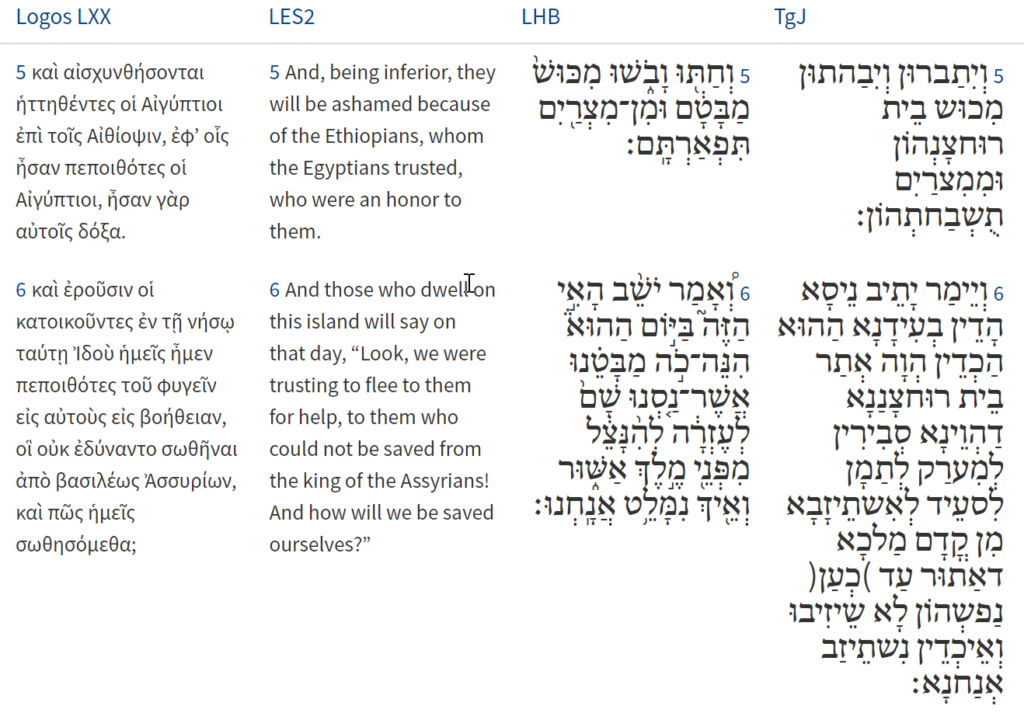
Here the LXX translates מַבָּטָם with the perfect active participle plural nominative verb πεποιθότες meaning to “win over, persuade, trust.” Those who trust in Egypt and Cush will be ashamed. The TgJ writes, 20:5 And they shall be afraid and confounded because of Cush, the place of their confidence, and because of Egypt, their boasting. 20:6 At that time the inhabitant of this island shall say: Such is become the place of our trust, to which we were hoping to flee for help to be delivered from before the king of Assyria, if hitherto they could not deliver themselves, how shall we be delivered? (TgJ) Egypt was not strong enough to save Ashdod the Philistine town, how can she save Israel, Judah, or Jerusalem? Isaiah concludes speaking of an island (הָאִי) saying “Behold, such is our expectation, whither we flee for help to be delivered from the king of Assyria: and how shall we escape?” The idea here is to an isolated people, as one is upon an island. Israel as a nation is small, and the surrounding nations appear large and ominous. We note that when an invading army comes into a land, they cause the people to flee, and the invading force leads to the people gathering together into a more centralized location. This is analogous to what Sargon did during his invasion and has a parallel to הָאִי “the island” that cries out in fear asking how they shall escape, just like what we are seeing here in Isaiah 20:6. The point is again all of these things are meant to lead the people to the God whom they can trust and rely upon, the God of Israel, the living and eternal God!
Rabbinic Commentary
The Targum Jonathan is an Aramaic and Rabbinic interpretation of the book of Isaiah and is therefore a very important resource for continuing to study the book of Isaiah!
תרגום יונתן בן עוזיאל אל ישעיה פרק כ:א-ו
א בְשַתָא דָאְתָא תַרתָן לְאַשדֹוד כַד שְלַח יָתֵיה סַרגֹון מַלכָא דְאַתוּר וַאְגִיַח קְרָבָא בְאַשדֹוד וְכַבשַה׃ ב בְעִידָנָא הַהוּא גְזַר יוי בְיַד יְשַעיָה בַר אָמֹוץ לְמֵימַר אִיזֵיל וְתֵיסַר סַקָא בְחַרצָך וּמסָנָך תִשלֹוף מֵעַל רַגלָך וַעְבַד כֵין אָזֵיל פְחַח וִיחֵיף׃ ג וַאְמַר יוי כְמָא דְהַלֵיך עַבדִי יְשַעיָה פְחַח וִיחֵיף תְלָת שְנִין אָת וּמֹופָת עַל מִצרָאֵי וְעַל כוּשָאֵי׃ ד כֵין יְדַבַר מַלכָא דְאַתוּר יָת שְבֵי מִצרַיִם וְיָת גָלוָת כוּש עוּלֵימִין וְסָבִין פָחְחִין וְיַחפִין וּגלַן עַריָא קְלַן מִצרָיִם׃ ה וְיִתַברוּן וְיִבַהתוּן מִכוּש בֵית רוּחצָנְהֹון וּמִמִצרַיִם תֻשְבַחתְהֹון׃ ו וְיֵימַר יָתֵיב נֵיסָא הָדֵין בְעִידָנָא הַהוּא הַכְדֵין הְוָה אְתַר בֵית רוּחצָנַנָא דַהְוֵינָא סְבִירִין לְמִערַק לְתַמָן לִסעֵיד לְאִשתֵיזָבָא מִן קֳדָם מַלכָא דאַתוּר עַד )כְעַן( נַפשְהֹון לָא שֵיזִיבוּ וְאֵיכְדֵין נִשתֵיזַב אְנַחנָא׃
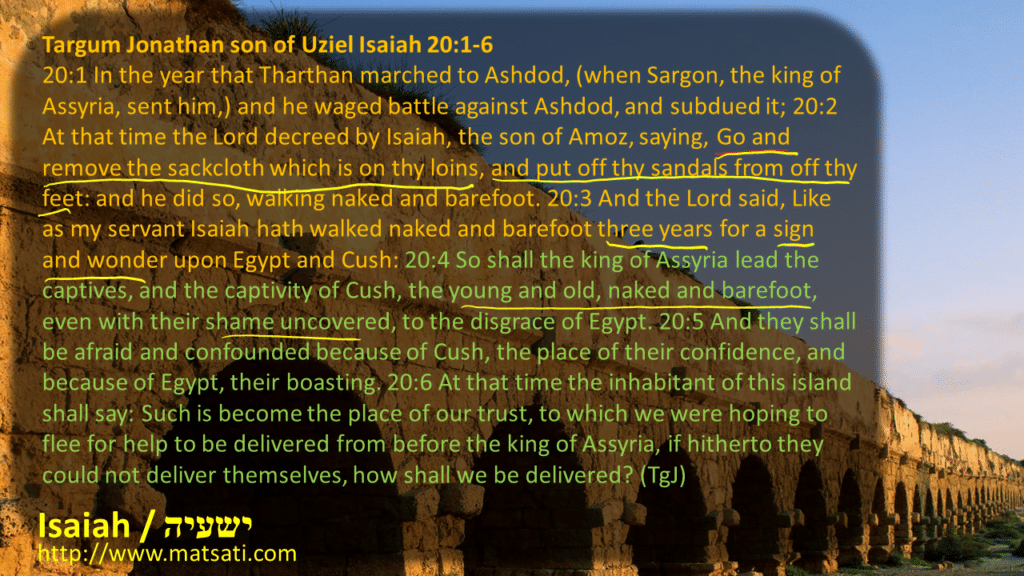
Targum Jonathan son of Uziel Isaiah 20:1-6
20:1 In the year that Tharthan marched to Ashdod, (when Sargon, the king of Assyria, sent him,) and he waged battle against Ashdod, and subdued it; 20:2 At that time the Lord decreed by Isaiah, the son of Amoz, saying, Go and remove the sackcloth which is on thy loins, and put off thy sandals from off thy feet: and he did so, walking naked and barefoot. 20:3 And the Lord said, Like as my servant Isaiah hath walked naked and barefoot three years for a sign and wonder upon Egypt and Cush: 20:4 So shall the king of Assyria lead the captives, and the captivity of Cush, the young and old, naked and barefoot, even with their shame uncovered, to the disgrace of Egypt. 20:5 And they shall be afraid and confounded because of Cush, the place of their confidence, and because of Egypt, their boasting. 20:6 At that time the inhabitant of this island shall say: Such is become the place of our trust, to which we were hoping to flee for help to be delivered from before the king of Assyria, if hitherto they could not deliver themselves, how shall we be delivered? (TgJ)
Here the TgJ writes that this Tharthan (תַרתָן) was sent by Sargon King of Assyria to Ashdod to wage war against Ashdod just as the TgJ translates: א בְשַתָא דָאְתָא תַרתָן לְאַשדֹוד כַד שְלַח יָתֵיה סַרגֹון מַלכָא דְאַתוּר וַאְגִיַח קְרָבָא בְאַשדֹוד וְכַבשַה׃ 20:1 In the year that Tharthan marched to Ashdod, (when Sargon, the king of Assyria, sent him,) and he waged battle against Ashdod, and subdued it. (TgJ) The TgJ literally writes saying, אִיזֵיל וְתֵיסַר סַקָא בְחַרצָך וּמסָנָך תִשלֹוף מֵעַל רַגלָך “go and bind sack on your loins and remove the shoe from your foot.” This is a striking difference from the English translation by Pauli saying that Isaiah was to remove the sackcloth and walk naked. Is there some sort of harmonization going on in the English translation by Pauli to be consistent with what the MSS is saying in Isaiah 20:2? ב בְעִידָנָא הַהוּא גְזַר יוי בְיַד יְשַעיָה בַר אָמֹוץ לְמֵימַר אִיזֵיל וְתֵיסַר סַקָא בְחַרצָך וּמסָנָך תִשלֹוף מֵעַל רַגלָך וַעְבַד כֵין אָזֵיל פְחַח וִיחֵיף׃ 20:2 At that time the Lord decreed by Isaiah, the son of Amoz, saying, Go and remove the sackcloth, which is on thy loins, and put off thy sandals from off thy feet: and he did so, walking naked and barefoot. ג וַאְמַר יוי כְמָא דְהַלֵיך עַבדִי יְשַעיָה פְחַח וִיחֵיף תְלָת שְנִין אָת וּמֹופָת עַל מִצרָאֵי וְעַל כוּשָאֵי׃ 20:3 And the Lord said, Like as my servant Isaiah hath walked naked and barefoot three years for a sign and wonder upon Egypt and Cush: (TgJ) This is serious difference in translation on whether the prophet walked naked, or was told to bind the sackcloth onto his loins. Note that Rashi draws out this important point according to His commentary.
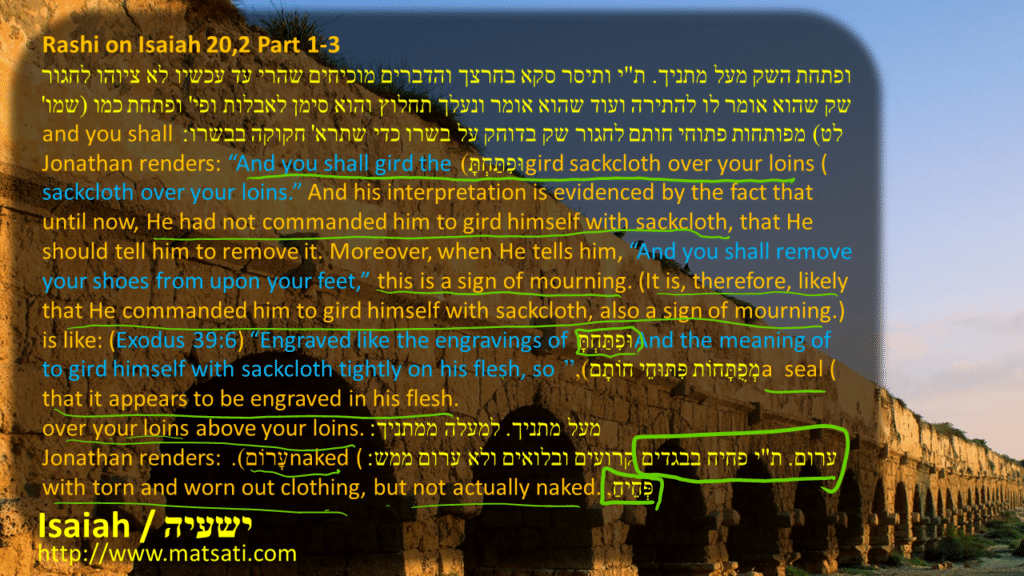
Rashi on Isaiah 20,2 Part 1-3
ופתחת השק מעל מתניך. ת”י ותיסר סקא בחרצך והדברים מוכיחים שהרי עד עכשיו לא ציוהו לחגור שק שהוא אומר לו להתירה ועוד שהוא אומר ונעלך תחלוץ והוא סימן לאבלות ופי’ ופתחת כמו (שמו’ לט) מפותחות פתוחי חותם לחגור שק בדוחק על בשרו כדי שתרא’ חקוקה בבשרו: and you shall gird sackcloth over your loins (וּפִתַּחְתָּ) Jonathan renders: “And you shall gird the sackcloth over your loins.” And his interpretation is evidenced by the fact that until now, He had not commanded him to gird himself with sackcloth, that He should tell him to remove it. Moreover, when He tells him, “And you shall remove your shoes from upon your feet,” this is a sign of mourning. (It is, therefore, likely that He commanded him to gird himself with sackcloth, also a sign of mourning.) And the meaning of וּפִתַּחְתָּ is like: (Exodus 39:6) “Engraved like the engravings of a seal (מְפֻתָּחוֹת פִּתּוּחֵי חוֹתָם),” to gird himself with sackcloth tightly on his flesh, so that it appears to be engraved in his flesh.
מעל מתניך. למעלה ממתניך: over your loins above your loins.
ערום. ת”י פחיח בבגדים קרועים ובלואים ולא ערום ממש: naked (עָרוֹם). Jonathan renders: פְּחֵיחַ, with torn and worn out clothing, but not actually naked.
Rashi writes based on the TgJ interpretation, “And you shall gird the sackcloth over your loins.” He also says that פְחַח is written to translate ערום for nakedness, that this word Jonathan translates means “torn and worn-out clothing” and not actual nakedness. This is consistent with the commands on morality taught according to the Torah. In the Mishnah Pirkei Avot 6:1, the rabbis discuss the importance and merits of Torah study.
Pirkei Avot 6:1
שָׁנוּ חֲכָמִים בִּלְשׁוֹן הַמִּשְׁנָה, בָּרוּךְ שֶׁבָּחַר בָּהֶם וּבְמִשְׁנָתָם: רַבִּי מֵאִיר אוֹמֵר כָּל הָעוֹסֵק בַּתּוֹרָה לִשְׁמָהּ, זוֹכֶה לִדְבָרִים הַרְבֵּה. וְלֹא עוֹד אֶלָּא שֶׁכָּל הָעוֹלָם כֻּלּוֹ כְדַי הוּא לוֹ. נִקְרָא רֵעַ, אָהוּב, אוֹהֵב אֶת הַמָּקוֹם, אוֹהֵב אֶת הַבְּרִיּוֹת, מְשַׂמֵּחַ אֶת הַמָּקוֹם, מְשַׂמֵּחַ אֶת הַבְּרִיּוֹת. וּמַלְבַּשְׁתּוֹ עֲנָוָה וְיִרְאָה, וּמַכְשַׁרְתּוֹ לִהְיוֹת צַדִּיק וְחָסִיד וְיָשָׁר וְנֶאֱמָן, וּמְרַחַקְתּוֹ מִן הַחֵטְא, וּמְקָרַבְתּוֹ לִידֵי זְכוּת, וְנֶהֱנִין מִמֶּנּוּ עֵצָה וְתוּשִׁיָּה בִּינָה וּגְבוּרָה, שֶׁנֶּאֱמַר (משלי ח) לִי עֵצָה וְתוּשִׁיָּה אֲנִי בִינָה לִי גְבוּרָה. וְנוֹתֶנֶת לוֹ מַלְכוּת וּמֶמְשָׁלָה וְחִקּוּר דִּין, וּמְגַלִּין לוֹ רָזֵי תוֹרָה, וְנַעֲשֶׂה כְמַעְיָן הַמִּתְגַּבֵּר וּכְנָהָר שֶׁאֵינוֹ פוֹסֵק, וֶהֱוֵי צָנוּעַ וְאֶרֶךְ רוּחַ, וּמוֹחֵל עַל עֶלְבּוֹנוֹ, וּמְגַדַּלְתּוֹ וּמְרוֹמַמְתּוֹ עַל כָּל הַמַּעֲשִׂים:
The sages taught in the language of the mishnah. Blessed be He who chose them and their teaching. Rabbi Meir said: Whoever occupies himself with the Torah for its own sake, merits many things; not only that but he is worth the whole world.He is called beloved friend; one that loves God; one that loves humankind; one that gladdens God; one that gladdens humankind. And the Torah clothes him in humility and reverence, and equips him to be righteous, pious, upright and trustworthy; it keeps him far from sin, and brings him near to merit. And people benefit from his counsel, sound knowledge, understanding and strength, as it is said, “Counsel is mine and sound wisdom; I am understanding, strength is mine” (Proverbs 8:14). And it bestows upon him royalty, dominion, and acuteness in judgment. To him are revealed the secrets of the Torah, and he is made as an ever-flowing spring, and like a stream that never ceases. And he becomes modest, long-suffering and forgiving of insult. And it magnifies him and exalts him over everything.
The rabbis describe Torah study as having many merits which includes such duties as honoring parents and performing acts of loving kindness among the mitzvot for which there is reward both in this world and the next. Morality is a fundamental outcome of drawing near to the God of Israel through the study of the Scriptures. Morality comes through instruction from parents and bible study, in addition to instruction by the hand of previous historical experience. This is why studying the Scriptures are so important since there is much historical evidence to understand what proper ethics and morals means in relation to what a holy and righteous God expects from us! Take for example Bildad, one of the friends of Job, says, “Just ask the first generations and investigate their ancestors, for we only came yesterday and our days are nothing more than a shadow” (Job 8:8-9, כִּֽי־שְׁאַל־נָ֭א לְדֹ֣ר רִישׁ֑וֹן וְ֝כוֹנֵ֗ן לְחֵ֣קֶר אֲבוֹתָֽם׃ כִּֽי־תְמ֣וֹל אֲ֭נַחְנוּ וְלֹ֣א נֵדָ֑ע כִּ֤י צֵ֖ל יָמֵ֣ינוּ עֲלֵי־אָֽרֶץ׃). What the text from Job is revealing to us is that a man must depend on the experience of earlier generations. It cannot be assumed that everything the ancients said is absolute truth, but even based on their errors it is possible in the end to generate a valid ethical approach to life. We note that when a society is left to itself to develop its own set of morals, we can see the degeneracy that takes place, especially in this present generation of people. Ethics and morals can improve only as far as one studies the holy Scriptures where God’s hand is involved in the lives of His people, those who seek Him. The point and significance of the TgJ writing, אִיזֵיל וְתֵיסַר סַקָא בְחַרצָך וּמסָנָך תִשלֹוף מֵעַל רַגלָך “go and bind sack on your loins and remove the shoe from your foot” is related to ethical behavior as a representative of God in heaven! This relates to both public and private life. The example is given from when a man once asked Rabbi Menahem Mendel of Kotzk to pray for him in order that his children might study the Torah diligently. The Rabbi replied: “If your children see that you are a diligent student, they will imitate you. But if you neglect your own studies, and instead merely wish your children to study, the result will be that they will do likewise when they grow up. They will neglect the Torah themselves and desire that their children do the studying.” (Legends of the Jews 2:2:84) This speaks to the importance of studying the Scriptures at home and living the example of moral and ethical living. This applied to Isaiah as well when going before Israel, Judah, and Jerusalem and the foreign nations as an example of what is going to happen to Cush. This is how the Talmud Bavli Yoma 77a describes this situation:
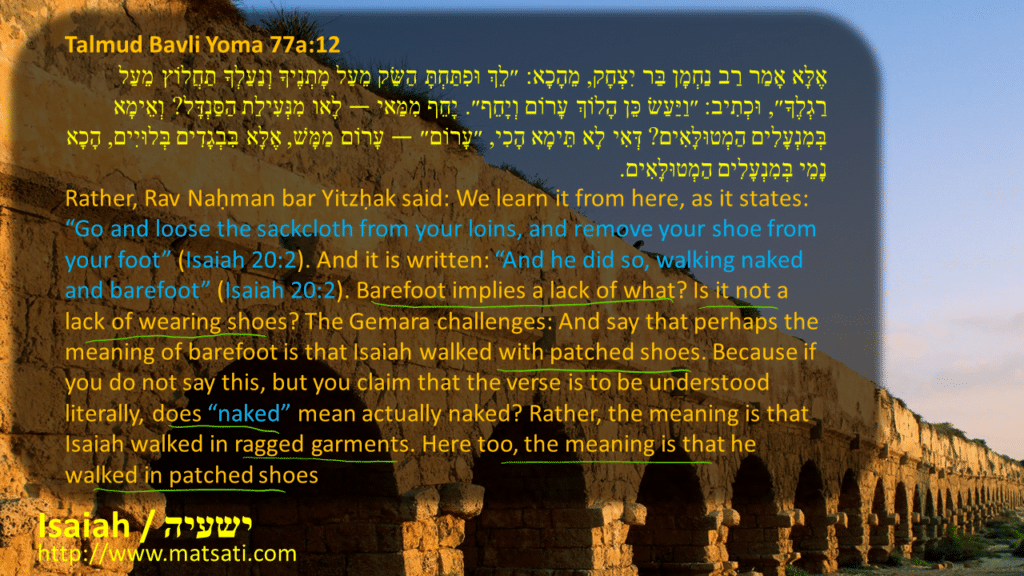
Talmud Bavli Yoma 77a:12
אֶלָּא אָמַר רַב נַחְמָן בַּר יִצְחָק, מֵהָכָא: ״לֵךְ וּפִתַּחְתָּ הַשַּׂק מֵעַל מׇתְנֶיךָ וְנַעַלְךָ תַחֲלוֹץ מֵעַל רַגְלֶךָ״, וּכְתִיב: ״וַיַּעַשׂ כֵּן הָלוֹךְ עָרוֹם וְיָחֵף״. יָחֵף מִמַּאי — לָאו מִנְּעִילַת הַסַּנְדָּל? וְאֵימָא בְּמִנְעָלִים הַמְטוּלָּאִים? דְּאִי לָא תֵּימָא הָכִי, ״עָרוֹם״ — עָרוֹם מַמָּשׁ, אֶלָּא בִּבְגָדִים בְּלוּיִים, הָכָא נָמֵי בְּמִנְעָלִים הַמְטוּלָּאִים.
Rather, Rav Naḥman bar Yitzḥak said: We learn it from here, as it states: “Go and loose the sackcloth from your loins, and remove your shoe from your foot” (Isaiah 20:2). And it is written: “And he did so, walking naked and barefoot” (Isaiah 20:2). Barefoot implies a lack of what? Is it not a lack of wearing shoes? The Gemara challenges: And say that perhaps the meaning of barefoot is that Isaiah walked with patched shoes. Because if you do not say this, but you claim that the verse is to be understood literally, does “naked” mean actually naked? Rather, the meaning is that Isaiah walked in ragged garments. Here too, the meaning is that he walked in patched shoes
The rabbis in the Talmud discuss the issue of not wearing shoes, and then that of being naked. The conclusion was that Isaiah wore ragged clothing and patched shoes as opposed to going completely naked. The reason is due to the moral issues related to doing such a thing and causing others to sin in impropriety, etc. Isaiah continues saying according to the TgJ, ד כֵין יְדַבַר מַלכָא דְאַתוּר יָת שְבֵי מִצרַיִם וְיָת גָלוָת כוּש עוּלֵימִין וְסָבִין פָחְחִין וְיַחפִין וּגלַן עַריָא קְלַן מִצרָיִם׃ 20:4 So shall the king of Assyria lead the captives, and the captivity of Cush, the young and old, naked and barefoot, even with their shame uncovered, to the disgrace of Egypt. ה וְיִתַברוּן וְיִבַהתוּן מִכוּש בֵית רוּחצָנְהֹון וּמִמִצרַיִם תֻשְבַחתְהֹון׃ 20:5 And they shall be afraid and confounded because of Cush, the place of their confidence, and because of Egypt, their boasting. ו וְיֵימַר יָתֵיב נֵיסָא הָדֵין בְעִידָנָא הַהוּא הַכְדֵין הְוָה אְתַר בֵית רוּחצָנַנָא דַהְוֵינָא סְבִירִין לְמִערַק לְתַמָן לִסעֵיד לְאִשתֵיזָבָא מִן קֳדָם מַלכָא דאַתוּר עַד )כְעַן( נַפשְהֹון לָא שֵיזִיבוּ וְאֵיכְדֵין נִשתֵיזַב אְנַחנָא׃ 20:6 At that time the inhabitant of this island shall say: Such is become the place of our trust, to which we were hoping to flee for help to be delivered from before the king of Assyria, if hitherto they could not deliver themselves, how shall we be delivered? (TgJ) We note what happens in the book of Jeremiah, the people flee to Egypt, and Jeremiah warns the people not to go because their sins will follow them, and the consequences of their sins will follow them. We note that Rashi agrees with our interpretation of Israel being referred to as an island.
Rashi on Isaiah 20,6 Part 1-2
יושב האי הזה. ארץ ישראל שהיו נשענים על פרעה לעזרה: the inhabitants of this isle The land of Israel, who relied on Pharaoh for aid. האי. לשון איי הים: isle like the islands of the sea.
The idea here is the Land of Egypt is not a reliable source for help. This draws us back to the concept Isaiah has been putting forward here in regard to trusting in the Lord God in heaven, the God of Israel for help, trusting in God and not man. Because the people did not look first to God and His holy word, deception crept into their understanding of the significance of trusting in the Lord. Deception is very subtle. The evil one comes by day and makes up excuses to stop studying the scriptures saying things like “I don’t have the time to read my bible today.” The deception also comes in the form of “I don’t need to study so much.” Following this path leads to less and less time spent reading and studying the Scriptures. The eventual outcome is the day is filled with nonsensical time filling activities like watching television as an example. Finally, the study of the Scriptures is abandoned altogether. Most don’t think this is important because they go to services and “try to be a good person” by avoiding the bigger sins. This approach leads to forgetting the call of God on our lives. This is what Isaiah is speaking of concerning the sins of the people compromising their faith in the Lord through seeking help from foreign nations. The idea that one sin leads to another sin is a reality. When one forgets the Lord, he or she forgets that we are always walking on holy ground as the children of God whose presence is in our lives. When we forget about the Lord God in heaven, our lives will become more and more profane and out of touch with the fear of God. Attending services then begins to become “optional” and attendance trickles down to simply the annual bigger holidays. Isaiah speaks of how sin in one’s life leads to shame and exile from the Lord. When our children see these things, they will grow up doing the same. Soon our own children will believe that the study of the scriptures and obedience to God’s word are optional “lifestyle choices,” and they will further walk away from the Lord. This is what happened in the lives of the children of Israel. These things stand as a historical precedence for our understanding such that we remain faithful to the Lord (i.e. we do not turn from the faith) and continue in God’s holy word and walking in His holy ways all the days of our lives! Remember, we have great hope in Yeshua the Messiah of God. We are told according to the NT scripture, that by our faith in Yeshua, our Father in heaven will send His Holy Spirit to dwell in our midst, to empower us to overcome this world and sin. The love of God is so great that He gave His son Yeshua for the forgiveness of our sins, and so that the Torah centric principle of God dwelling in our midst could become a reality in our lives today! This is the great hope that we have, that we can have a relationship with God in heaven, and have fullness of life in Yeshua the Messiah!
